Visual Basic for Applications (VBA) is an implementation of Microsoft's event-driven programming language Visual Basic 6.0 built into most desktop Microsoft Office applications. Although based on pre-.NET Visual Basic, which is no longer supported or updated by Microsoft, the VBA implementation in Office continues to be updated to support new Office features. VBA is used for professional and end-user development due to its perceived ease-of-use, Office's vast installed userbase, and extensive legacy in business.
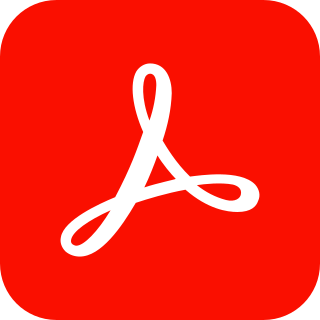
Adobe Acrobat is a family of application software and web services developed by Adobe Inc. to view, create, manipulate, print and manage Portable Document Format (PDF) files.

gedit is a text editor designed for the GNOME desktop environment. It was GNOME's default text editor and part of the GNOME Core Applications until GNOME version 42 in March 2022, which changed the default text editor to GNOME Text Editor. Designed as a general-purpose text editor, gedit emphasizes simplicity and ease of use, with a clean and simple GUI, according to the philosophy of the GNOME project. It includes tools for editing source code and structured text such as markup languages.
FileMaker is a cross-platform relational database application developed by Claris International, a subsidiary of Apple Inc. It integrates a database engine with a graphical user interface (GUI) and security features, allowing users to visually modify a database. Versions for desktops, servers, iOS, and web-delivery have been released.
FamilySearch GEDCOM, or simply GEDCOM, is an open file format and the de facto standard specification for storing genealogical data. It was developed by The Church of Jesus Christ of Latter-day Saints, the operators of FamilySearch, to aid in the research and sharing of genealogical information. A common usage is as a standard format for the backup and transfer of family tree data between different genealogy software and Web sites, most of which support importing from and exporting to GEDCOM format.

System 7 is the seventh major release of the classic Mac OS operating system for Macintosh computers, made by Apple Computer. It was launched on May 13, 1991, to succeed System 6 with virtual memory, personal file sharing, QuickTime, TrueType fonts, the Force Quit dialog, and an improved user interface.
In software engineering, a compatibility layer is an interface that allows binaries for a legacy or foreign system to run on a host system. This translates system calls for the foreign system into native system calls for the host system. With some libraries for the foreign system, this will often be sufficient to run foreign binaries on the host system. A hardware compatibility layer consists of tools that allow hardware emulation.
This is a comparison of both historical and current web browsers based on developer, engine, platform(s), releases, license, and cost.

Dashboard is a discontinued feature of Apple Inc.'s macOS operating systems, used as a secondary desktop for hosting mini-applications known as widgets. These are intended to be simple applications that do not take time to launch. Dashboard applications supplied with macOS included a stock ticker, weather report, calculator, and notepad; while users could create or download their own.
This article provides basic comparisons for notable text editors. More feature details for text editors are available from the Category of text editor features and from the individual products' articles. This article may not be up-to-date or necessarily all-inclusive.
Graphite is a programmable Unicode-compliant smart font technology and rendering system developed by SIL International as free software, distributed under the terms of the GNU Lesser General Public License and the Common Public License.
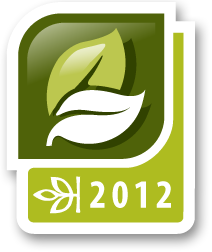
Family Tree Maker is genealogy software for Windows and Mac that allows the researcher to keep track of information collected during research and to create reports, charts, and books containing that information. The software was originally developed by Kenneth Hess of Banner Blue Software, which was purchased by Broderbund in 1995. It passed through the hands of The Learning Company, SoftKey, Mattel, and others before coming under its current ownership. A redesigned Family Tree Maker 2008 was released on August 14, 2007. The 2009 version of the program corrected some of the errors and omissions of its predecessor, and introduced a few new features. Family Tree Maker 2010 claimed to further enhance the radical redesign and be more powerful and feature-packed with faster navigation and quicker load times.
Reunion is genealogy software made by Leister Productions, Inc., a privately held firm established by Frank Leister in 1984 located in Mechanicsburg, Pennsylvania. The company operates as a genealogy software developer exclusively for macOS and iOS. Reunion was initially a Macintosh application, programmed in Apple's HyperCard. Version 4 was available for Windows and Macintosh until the Windows version was sold to Sierra in 1997.
Personal Ancestral File (PAF) was a free genealogy software program provided by FamilySearch, a website operated by the Church of Jesus Christ of Latter-day Saints. It was first released in 1983, last updated in 2002, and formally discontinued in 2013. It allowed users to enter names, dates, citations and source information into a database, and sort and search the genealogical data, print forms and charts, and share files with others in GEDCOM format. PAF also linked images and other media files to individual records.

Legacy Family Tree is genealogy software for Windows that assists family historians in tracking, organizing, printing, and sharing family history. The software is distributed as freeware, with no restrictions, only requiring registration on the company's web site to download the software.
This article compares several selected client-based genealogy programs. Web-based genealogy software is not included.
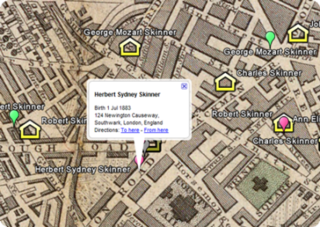
Family tree mapping is the process of geocoding places in family tree files to produce geospatial data suitable for viewing with a virtual globe or 2D mapping program.
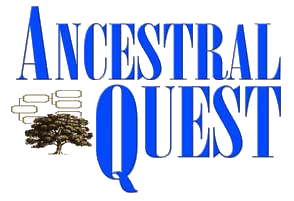
Ancestral Quest (AQ) is a genealogy software application for Microsoft Windows developed by Incline Software, LC. It features data entry with sourcing capabilities and scrapbook extensions; a print engine for standard or custom charts and reports; a web page creator; a collaboration engine; and an extension tool for other genealogy databases.

TreeDraw is a genealogy program for computers running Microsoft Windows. The program is a chart editor which aids family historians in creating and printing family trees. Developed by SpanSoft, Scotland, the software is distributed as shareware with a free trial period.
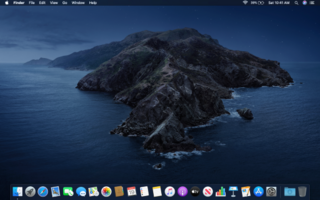
macOS Catalina is the sixteenth major release of macOS, Apple Inc.'s desktop operating system for Macintosh computers. It is the successor to macOS Mojave and was announced at WWDC 2019 on June 3, 2019 and released to the public on October 7, 2019. Catalina is the first version of macOS to support only 64-bit applications and the first to include Activation Lock. It is also the last version of macOS to have the major version number of 10; its successor, Big Sur, released on November 12, 2020, is version 11. In order to increase web compatibility, Safari, Chromium and Firefox have frozen the OS in the user agent running in subsequent releases of macOS at 10.15.7 Catalina.








